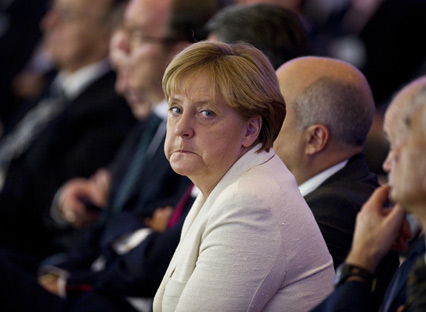Angela Merkel in search of a legacy as she kicks off fourth term
Paucity of domestic policies suggests Europe will be main focus for re-elected German chancellor

A free daily email with the biggest news stories of the day – and the best features from TheWeek.com
You are now subscribed
Your newsletter sign-up was successful
Angela Merkel was formally sworn in today after being elected to serve a fourth term as chancellor by German lawmakers.
The vote in parliament ended almost six months of political turmoil, “after a federal election saw millions of voters desert the two mainstream parties” - Merkel’s Christian Democratic Union (CDU) and the Social Democratic Party (SPD) - “turning instead to parties on the Left and Right”, says CNN.
The chancellor’s re-election was carried with a majority of just nine votes above the threshold required (355 of 709 MPs).
The Week
Escape your echo chamber. Get the facts behind the news, plus analysis from multiple perspectives.

Sign up for The Week's Free Newsletters
From our morning news briefing to a weekly Good News Newsletter, get the best of The Week delivered directly to your inbox.
From our morning news briefing to a weekly Good News Newsletter, get the best of The Week delivered directly to your inbox.
Her narrow victory marks the final stepping stone on the path to Germany’s new government - a renewal of the so-called grand coalition, or “GroKo”, between her CDU and its alliance partner the Christian Social Union in Bavaria (CSU), and the SPD.
“We have a lot of work ahead of us,” Merkel said after the formal signing of the coalition deal with the SPD on Monday.
In what The Guardian describes as a nod “to the language and concerns of the far-right”, Merkel vowed that her government would be a “grand coalition for the little people”.
She said that her new government would focus on “the integration of refugees, but also on the state’s ability to act when people have not been granted right of residence”.
A free daily email with the biggest news stories of the day – and the best features from TheWeek.com
Merkel’s newest, and probably her last, team “is much like her - dependable, if a bit boring”, says Politico.
But “after the tumultuous, six-month coalition-building phase, boring might be a good thing”, adds the website.
According to German newspaper Deutsche Welle, there will be a “wide variety of topics on the agenda at Merkel’s first cabinet meeting”, including domestic security; achieving full employment by 2025; protecting Europe’s external borders; and the relationship with the US, Russia and China.
But commentators believe that the overall scope for progress is limited.
On the domestic front, “the concessions and restraint required to pull the CDU, the CSU and the SPD back together for one more reluctant grand coalition made - perhaps unavoidably - for a fairly visionless coalition deal”, says The Economist.
Europe may prove to be the one issue on which Merkel can make her mark.
For months, “politicians of all stripes have spoken with somber urgency of the need for Berlin to formulate a response to French President Emmanuel Macron’s proposals for reforming the European Union”, says Politico’s Matthew Karnitschnig.
Merkel now “has the time, opportunity and most importantly the good reasons to achieve something of substance on Europe, but only if she is willing to fight for it in Berlin”, adds The Economist. “Now to see if she does.”
-
 Antonia Romeo and Whitehall’s women problem
Antonia Romeo and Whitehall’s women problemThe Explainer Before her appointment as cabinet secretary, commentators said hostile briefings and vetting concerns were evidence of ‘sexist, misogynistic culture’ in No. 10
-
 Local elections 2026: where are they and who is expected to win?
Local elections 2026: where are they and who is expected to win?The Explainer Labour is braced for heavy losses and U-turn on postponing some council elections hasn’t helped the party’s prospects
-
 6 of the world’s most accessible destinations
6 of the world’s most accessible destinationsThe Week Recommends Experience all of Berlin, Singapore and Sydney
-
 Epstein files topple law CEO, roil UK government
Epstein files topple law CEO, roil UK governmentSpeed Read Peter Mandelson, Britain’s former ambassador to the US, is caught up in the scandal
-
 Iran and US prepare to meet after skirmishes
Iran and US prepare to meet after skirmishesSpeed Read The incident comes amid heightened tensions in the Middle East
-
 Grok in the crosshairs as EU launches deepfake porn probe
Grok in the crosshairs as EU launches deepfake porn probeIN THE SPOTLIGHT The European Union has officially begun investigating Elon Musk’s proprietary AI, as regulators zero in on Grok’s porn problem and its impact continent-wide
-
 Israel retrieves final hostage’s body from Gaza
Israel retrieves final hostage’s body from GazaSpeed Read The 24-year-old police officer was killed during the initial Hamas attack
-
 China’s Xi targets top general in growing purge
China’s Xi targets top general in growing purgeSpeed Read Zhang Youxia is being investigated over ‘grave violations’ of the law
-
 Panama and Canada are negotiating over a crucial copper mine
Panama and Canada are negotiating over a crucial copper mineIn the Spotlight Panama is set to make a final decision on the mine this summer
-
 Europe moves troops to Greenland as Trump fixates
Europe moves troops to Greenland as Trump fixatesSpeed Read Foreign ministers of Greenland and Denmark met at the White House yesterday
-
 Why Greenland’s natural resources are nearly impossible to mine
Why Greenland’s natural resources are nearly impossible to mineThe Explainer The country’s natural landscape makes the task extremely difficult